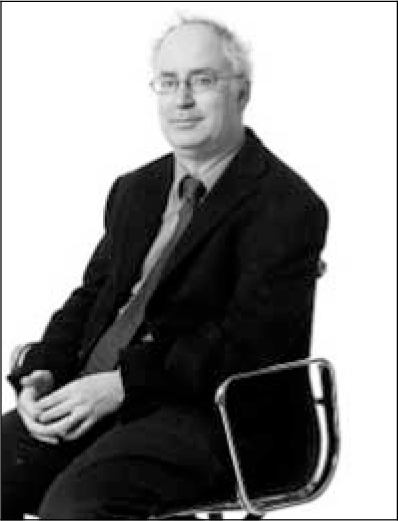
Professor Simon Wessely, FRCP, FRCPsych, FMedSci, is Professor and Head of the Department of Psychological Medicine and Vice-Dean for Academic Psychiatry at the King's Institute of Psychiatry. He is highly distinguished for his work on unexplained symptoms, syndromes and military health.
With Professor Christopher Dandeker he is co-director of the King's Centre for Military Health Research, a unique collaboration between the Institute of Psychiatry and the King's Department of War Studies, founded in 2003. Its flagship project, a large-scale study of the health and well-being of the UK armed forces, has had a direct impact on public policy and on forms of treatment and help for service personnel.
A graduate of the universities of Cambridge, Oxford and London, Professor Wessely has been a consultant psychiatrist at King's College Hospital and the Maudsley Hospital since 1991. He became Director of the Chronic Fatigue Research Unit at King's in 1994 and of the Gulf War Illness Research Unit in 1996. He is Civilian Consultant Advisor in Psychiatry to the British army and a member of the Defence Scientific Advisory Council.
Professor Wessely has over 600 original publications, including a history of military psychiatry and a study of psychological reactions to terrorism. He has been honoured by the Advisory Committee on Clinical Excellence Awards; the Royal College of Physicians; the British Society for Rheumatology; the American Psychiatric Association; and the Association of British Neurologists. He is a trustee of Combat Stress, and his contributions to veterans’ charities include cycling to Paris to raise funds for the Royal British Legion.
What are you working on today?
Putting pins into an effigy of Simon Lovestone for persuading me to join the Maudsley team doing the NightRider cycle all around London next Saturday night.
What is your idea of a perfect mental health service?
One that is not called a mental health service, but sits alongside, within and indivisible from the rest of healthcare.
Which psychiatrists, living or dead, do you most admire?
Tony David is the most extraordinary all-rounder that I have ever met, Maria Ron gave me a kick up the career ladder, and Robin Murray helped me stay there. Derek Summerfield, because he is incapable of being boring and does not mind annoying people, and Trevor Turner because he can get tickets for Lords. I also admired a chap I met at a traumatic stress meeting, who came from Sierra Leone, and patiently listened to a panel opining on all the complex treatments that the troubled and traumatised in Sierra Leone should be receiving. At the end he quietly pointed out that there was only one psychiatrist in the whole country, that was him, and did they have any other suggestions?
What do you consider to be your greatest achievement?
Helping to show that chronic fatigue syndrome can be treated.
What has been your most controversial idea?
The same.
What frustrates you most about working in psychiatry?
The increasing tendency to decouple psychiatry from medicine, which would be the greatest disaster in our history.
What do you most dislike about the way you are portrayed in the media?
My haircut, although it would be unfair to blame the media for that. Otherwise I think the media are very fair in their reporting of doctors including myself, but the internet, that's another matter. Fairness, accuracy, tolerance and standards are not the words that come to mind.
Which phrase or saying do you use most when speaking to trainees?
‘You really ought to write that up.’
What single thing would improve the quality of your work?
Being able to teach and talk to trainees without having to fill in a form every time you do so. Mary Beard recently wrote: ‘One day, I hope, someone will look back on the way we spend all our time on process and paper trails (rather than doing the job and changing people's minds), and they will wonder where, when or why we forgot what we were really about’. Am I allowed something else? In that case, genuinely secure bike parking.
What is the most important lesson that working with veterans has taught you?
That those who have served in the armed forces and who are now experiencing problems or difficulties of whatever nature, remain proud people whose self-image is based on coping and resilience. Victim culture is not part of their nature, and we should ensure that we don't treat them that way. Most are neither hero nor victim, but professional.
What has been your biggest disappointment?
That no matter how hard I tried, I simply did not have the ear to play jazz.
What's your biggest fear?
The NHS ‘reforms’. I would like to think that our system of checks, balances, common sense and general inertia will mean that the worst will not come to pass, but I wish I could be confident about that.
What was the last book you read?
Two on the go at the moment. Paul Preston's Spanish Holocaust,a searing account of Franco's savagery, and Mark Henderson's Geek Manifesto. Don't like the title, but it's a gripping account of contemporary science, policy and media.
How would you like to be remembered?
I heard a senior general say that he would like written on his tombstone the three things he had learnt in life, which were ‘Never march on Moscow, invade the Balkans or trust the RAF’. I would like to think that mine would be ‘He was always kind to patients, kept to deadlines and knew how to time a joke’.



eLetters
No eLetters have been published for this article.